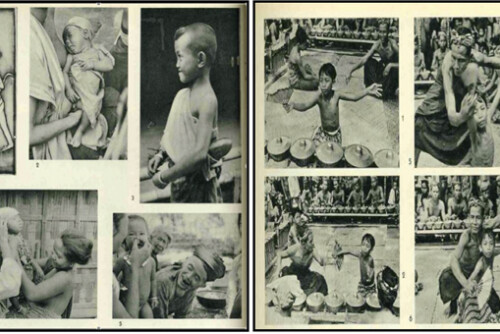Gendered Migration and the Philippine Nation
Alongside the concerns about the consequences of women’s migration on their families were concerns about the consequences of women’s migration on the nation more broadly. In the same “Public Attitudes” survey, gauging respondents’ perspectives on the impacts of Filipina migration within the context of the family, the SWS also asked respondents to what extent they agreed or disagreed with the test statement, “Women working abroad bring shame to our country.” 1 That alongside questions on women’s migration and family was a question on national shame relates to McClintock’s argument that, “nations are figured through the iconography of familial and domestic space.” 2 The questions on the “Public Attitude” survey rest on the logic that women’s employment as low-wage, low-status workers has negative implications for the global representation of the Philippine nation-state.
While the “Public Attitudes” survey results revealed that there was little consensus amongst respondents across gender, class and region, the SWS came to the following conclusion:
[O]n the statement that women workers overseas bring shame to the country, the predominant position is disagreement (47 percent). Still, the percentages who outright agree (21 percent) and those who neither agree nor disagree (32 percent) are, uncomfortably high. 3
By discussing the findings in this way, SWS effectively colludes in producing women’s migration as a national shame even as the “objective” figures do not indicate that the feeling of nationalist shame is widespread. Indeed, it can been argued that the SWS’ findings reveal that most people (79 percent) either do not believe that women’s migration is shameful or are ambivalent, even as they may be concerned about its effects on families. Yet, the SWS concludes that people’s sense of shame is “uncomfortably” high. By highlighting the uncomfortable “fact” of nationalist shame, the SWS ultimately produces it as an issue.
Radcliffe notes how, “social identities, including national identities, are constituted through relations of intersubjectivity, that is the (partial) internalisation of others’ images of oneself.” 4 Survey respondents’ (and survey researchers’) beleaguered sense of nationalism is shaped by this intersubjective process, but within an international arena. As Neferti Tadiar argues, the migration of domestic workers produces nationalist anxieties about the Philippines’ global status. 5 The hypervisibility of Filipinas abroad as domestic workers and their invisibility at “home” (that is, the household and the nation-state) raises concerns about the gendered representation of the Philippine nation-state in the global context. Though Filipina migrants work overseas as caregivers to other children, what is more desirable is that they act as caregivers to their own children in their homes in the Philippines. It is precisely because Filipina migrants care for the children of other nations as low-status domestic workers that anxieties about the Philippine nation emerge.
In a dialogue organized by migrant advocates (which was comprised of both migration scholars and staff members of migrant-serving NGOs) aimed at offering policy recommendations to migration officials who were also participants, concerns about the migration of women as domestic workers and its impact on the nation’s subject-status emerged. A representative from Kanlungan, a migrant NGO bemoaned, “More female workers are now going out and what kind of jobs do they get? Domestic helpers.” 6
Implicit in this NGO staff member’s critique of the Philippine state’s export of domestic workers is a critique of the nature of this particular form of work. Though migrant women activists have often called for the valuation of domestic work, indeed, Filipina migrant activists have frequently called less for the banning of domestic work but instead for better terms of employment, this NGO staffer ultimately shares the perspective that domestic worker is “shameful.” 7
The issue of Filipinas’ sexuality is of particular concern in relation to migrants employed as entertainers. Indeed, the dialogue I discuss above was initiated precisely out of a concern that, “the country has been demeaned as the global supplier of maids, entertainers, and in Japan, specifically of prostitutes.” 8 In the case of entertainers who are characterized as no different from prostituted women, the nation-state is shamed because it cannot control its women, whose fate is in the hands of foreign men.
In either case, whether women work as domestic workers or as entertainers, the state is shamed for its inability to ensure that women live up to idealized notions of femininity and sexuality. Even when shame is not at issue, but rather concern for victimized women, civil society actors come to the same conclusion, that is, that the state must better protect women migrants.
- Ma. Alcestis Abrera-Mangahas, “Public Attitudes Towards Female Overseas Workers: Implications for Philippine Migration Policy.”[↑]
- Anne McClintock, “Family Feuds: Gender, Nationalism and the Family.” Feminist Review 44, 1994, 61-81.[↑]
- Ma. Alcestis Abrera-Mangahas, “Public Attitudes Towards Female Overseas Workers: Implications for Philippine Migration Policy.”[↑]
- Sarah Radcliffe, “Gendered Nations: Nostalgia, development and territory in Ecuador.” Gender, Place and Culture 3, 1996, 5-21.[↑]
- Neferti Tadiar, “Domestic Bodies of the Philippines.” Soujourn 12, 1997, 153-91.[↑]
- Solidarity, “Filipinos Overseas: Is it Worth All Those Dollars?”[↑]
- UNIFIL, an organization of self-organized Filipina domestic workers in Hong Kong has been struggling for many years for better wages and working conditions (Migrante International, 2005).[↑]
- Solidarity, “Filipinos Overseas: Is it Worth All Those Dollars?”[↑]


